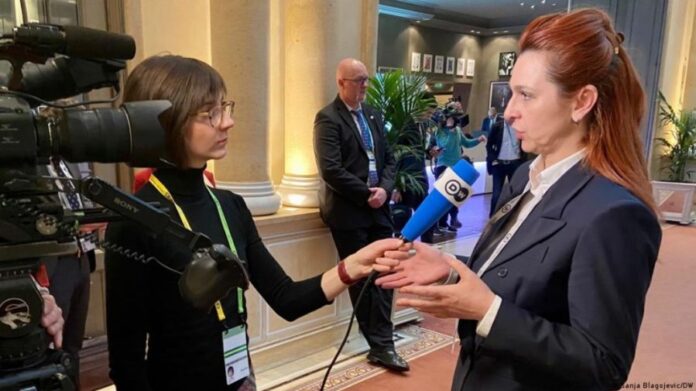The Minister of the Interior of the Republic of Moldova, Ana Revenco, present at the Security Conference in Munich, listed for DW the problems that Moldova is currently facing, in the context of the war in Ukraine. “The mission remains the same – to protect democracy in the Republic of Moldova and also to make a contribution to protecting democracy in Europe, and the free world. The pressures however are increasing”.
First, she was asked about information on potential plots against the government. “There is a hybrid war that Russia is orchestrating with the help of fugitive oligarchs. It has been almost a year since Russia is massively supporting this war in the Republic of Moldova. You know, last year, on February 24, when Russia started military aggression in Ukraine, a similar escalation happened in Moldova: all the threats increased. And now we see all the elements of an unconventional war, which put the government under very high pressure, draining the budget and distracting us from the development agenda, radicalizing society and causing massive destabilization.
All this is intended to change the democratic course of Chisinau, to bring the war to the country and to bring Russia closer to the areas where NATO troops are concentrated. This would mean that Russia would gain access to airspace closer to the Russian troops massed in the Transnistrian region. This would also mean for Russia access to the Danube through our port.
Finally, this would mean obtaining a very important bridgehead and a position of strength for negotiations with Brussels. Ultimately, this would mean aggravating Ukraine’s vulnerability. If a third conventional front opens in Chisinau, it will also deconcentrate Ukraine’s defense capabilities. This is exactly the impact that Russia wants through these very intense elements of the hybrid war that it is now waging and amplifying in the Republic of Moldova.
The instrumentalization of migration, the food insecurity, the attack on the normality of everyday life – these are the targets of the hybrid war that Russia is waging. There is very intense propaganda, massive disinformation operations, aimed at distracting the population from normal, economic, social, cultural life, to decrease the population’s trust in the authorities. Unfortunately, Russia has been able to wage this kind of war throughout the 30 years since independence. But in the last year we saw how intense this war has become in the whole country”, declared Ana Revenco.
FOR THE MOST IMPORTANT NEWS, SUBSCRIBE TO OUR TELEGRAM CHANNEL!
As for what the government is doing to prevent destabilization, the minister replied that: “First of all we need unity. Unity with the entire democratic and free world. We must understand that not only Moldovan or Ukrainian security or democracy is threatened, but the entire security and democracy in Europe. And this forum for which we all gathered today [..] brings us closer to each other, makes us stand clearly united against Russia’s aggression and helps us learn the first lessons.
One of them is that we have to support each other. The Republic of Moldova has already received support from some European Union states. We signed the Frontex agreement, which now allows a number of Frontex specialists to work hand-in-hand, shoulder-to-shoulder, with our border police on both borders – on our eastern border, which is our border at war, but also on the western one, which is the border with the EU. We secure both borders and act to deter cross-border crime. This is a very strong support for us.
At the same time, as we see these threats gain momentum and intensity, having a strong impact on national resilience, we need more technology, equipment, special tools, to support our current efforts, which not only the system of the Ministry of the Interior submits them, but also many other government systems, in order to be able to withstand. This would help us not only to place ourselves in the resilient zone of the crisis, but also to develop. We understood very well that those conditions that were imposed on the Republic of Moldova as soon as it got the status of a candidate country will only bring advantages in terms of development.
We fully understand this, we have developed mechanisms and actions are already underway. We are working on legislation. We are working on protocols, on tools. But, I repeat, we need additional support to increase the efficiency of these measures in terms of building some functional capabilities”, concluded Revenco.


